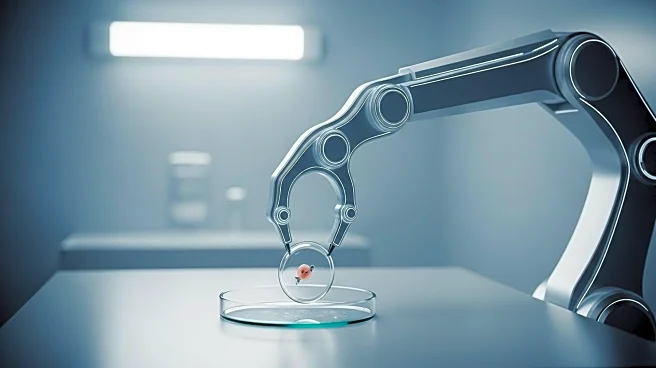What is the story about?
What's Happening?
In Mexico City, a groundbreaking clinical trial is underway where robots are being used to assist in in-vitro fertilization (IVF). This trial, conducted at a clinic in the upscale neighborhood of Polanco, involves the use of a robotic system called Aura, developed by Conceivable Life Sciences. The system automates 205 manual steps in the IVF process, from egg freezing to embryo creation, using advanced robotics and artificial intelligence. This technology aims to improve the precision and consistency of IVF procedures, which traditionally rely heavily on human expertise. The trial has already resulted in the birth of at least 20 babies, marking a significant milestone in the application of AI in reproductive medicine.
Why It's Important?
The introduction of robotics and AI in IVF could revolutionize fertility treatments by making them more accessible and affordable. Currently, IVF is a costly procedure, often out of reach for many couples, especially in developing countries. By automating the process, the technology could reduce costs and increase the availability of fertility treatments, addressing what the World Health Organization describes as a global infertility issue affecting one in six people of reproductive age. This development could also alleviate the burden on medical professionals, allowing clinics to handle more cases with greater efficiency and potentially improving success rates.
What's Next?
As the trial progresses, the focus will be on evaluating the long-term outcomes of AI-assisted IVF and its potential for wider adoption. Regulatory approval in the U.S. and other countries will be crucial for the commercial deployment of these technologies. Stakeholders, including fertility clinics, healthcare providers, and patients, will be closely monitoring the results to assess the viability and safety of robotic IVF. If successful, this could lead to a paradigm shift in how fertility treatments are conducted globally.
Beyond the Headlines
The use of AI in IVF raises ethical and regulatory questions, particularly concerning the transparency and accountability of AI decision-making processes. As these technologies become more prevalent, there will be a need for clear guidelines and oversight to ensure ethical standards are maintained. Additionally, the cultural acceptance of AI in reproductive health will vary, potentially influencing the adoption rate in different regions.
















